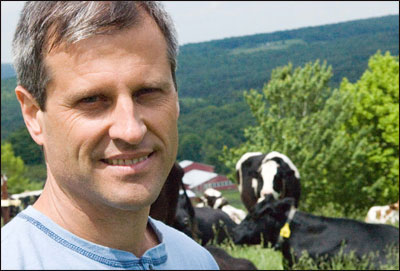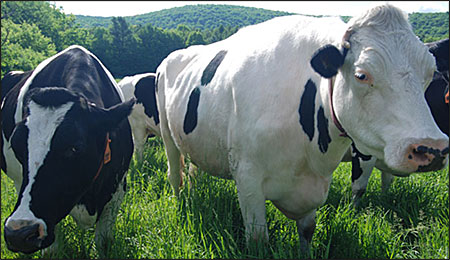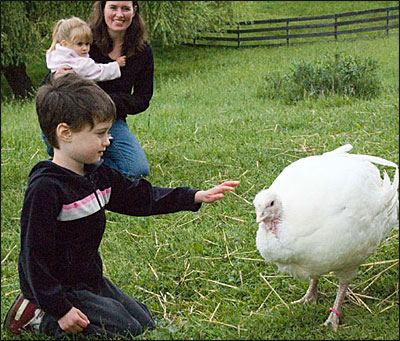OTHER U.S. PROGRAMS
Farm Animal Sanctuary, Upstate New York
 In upstate New York, Gene Baur and his Farm Sanctuary is the focus of one of the key domestic chapters in Sanctuary. It was also a key filming location for DSF’s “Mad Cowboy”. DSF was honored to be able to help disseminate word of the fine work that Gene and his colleagues have engaged in for over twenty years, putting a face on all those billions of cows, sheep, turkeys, chickens and the like that end up on dinner plates, as leather handbags or fur coats. More than 52 billion so-called “farm animals” are slaughtered globally each year for human consumption of one form or other, and that does not include the tens of billions of fish that are killed. In the U.S., over 9 billion chickens and over 97 million bovines are slaughtered annually. Gene and colleagues have worked steadily to cast light on the abuses of the slaughter and transport industries; the indifference of many lawmakers and consumers; and the whole system of cruelty that has trapped so many animals from the moment they are born to the moment of their terrible deaths. Farm Sanctuary, near Ithaca, New York, as well as their sanctuary near Orland, California are two places where families may come to commune with rescued animals and realize how wonderful, spiritual, magical they are, up close and personal.
In upstate New York, Gene Baur and his Farm Sanctuary is the focus of one of the key domestic chapters in Sanctuary. It was also a key filming location for DSF’s “Mad Cowboy”. DSF was honored to be able to help disseminate word of the fine work that Gene and his colleagues have engaged in for over twenty years, putting a face on all those billions of cows, sheep, turkeys, chickens and the like that end up on dinner plates, as leather handbags or fur coats. More than 52 billion so-called “farm animals” are slaughtered globally each year for human consumption of one form or other, and that does not include the tens of billions of fish that are killed. In the U.S., over 9 billion chickens and over 97 million bovines are slaughtered annually. Gene and colleagues have worked steadily to cast light on the abuses of the slaughter and transport industries; the indifference of many lawmakers and consumers; and the whole system of cruelty that has trapped so many animals from the moment they are born to the moment of their terrible deaths. Farm Sanctuary, near Ithaca, New York, as well as their sanctuary near Orland, California are two places where families may come to commune with rescued animals and realize how wonderful, spiritual, magical they are, up close and personal.
Gene’s efforts began in 1986 with a single gruesome discovery of a sheep that he and his partner Lorri would subsequently name Hilda. Hilda would have been just another statistic, heaped in a pile of animals left for dead. Hilda had passed out from injuries and heat exhaustion in a cramped truck that had taken her to be slaughtered. Once found, she was rescued and rehabilitated in the backyard shed of Gene’s home in Delaware. As the number of rescued animals grew, it became clear that more land was needed. Farm Sanctuary grew up as a result.
 The revelatory literature regarding the nightmare of factory farming is now considerable, dating to the early debates in the British Parliament beginning around 1809; the first anti-vivisection laws; and then, the 1906 publication of Upton Sinclair’s portrait of slaughterhouses in Chicago, in his novel The Jungle. When Gene founded Farm Sanctuary few people had ever actually gotten inside slaughterhouses to investigate abuse and cruelty and lack of compliance with the Animal Welfare Act. But details have since come to light, in part due to consumer fears about tainted meat and transmissible diseases that were less known a generation ago. Gene, who studied agricultural economics at Cornell College in Ithaca, has declared calmly that factory farms are inherently wrong. “There’s no reason for them in this day and age.”
The revelatory literature regarding the nightmare of factory farming is now considerable, dating to the early debates in the British Parliament beginning around 1809; the first anti-vivisection laws; and then, the 1906 publication of Upton Sinclair’s portrait of slaughterhouses in Chicago, in his novel The Jungle. When Gene founded Farm Sanctuary few people had ever actually gotten inside slaughterhouses to investigate abuse and cruelty and lack of compliance with the Animal Welfare Act. But details have since come to light, in part due to consumer fears about tainted meat and transmissible diseases that were less known a generation ago. Gene, who studied agricultural economics at Cornell College in Ithaca, has declared calmly that factory farms are inherently wrong. “There’s no reason for them in this day and age.”
Gene and colleagues are actively engaged in education and legal reform work. In the year 2006, Farm Sanctuary sponsored a ballot initiative that was passed in the State of Arizona “outlawing gestation crates and veal crates”. Five Farm Sanctuary sponsored events in 44 cities throughout the U.S. devoted to a “Walk for Farm Animals” day took place. Also in that year Farm Sanctuary rescued 120 “broiler” chickens from “an abandonment case” in Brooklyn, New York; campaigned in Chicago against Foie Gras production; issued a scientific report pertaining to “The Welfare of Cattle in Beef Production”; and provided an oasis of peace and love for 1,500 more animals between its two refuges. At the same time, Gene has continued to campaign to prevent the suffering of “downed animals”; to promote more humane standards in New Jersey; to institute a national ban on battery cages and gestation crates; and other reforms he views as essential within the American Veterinary Medical Association. That’s for starters. Farm Sanctuary issues “go vegetarian” checkbooks which also read: Stand Up For Animals. They sell vegan cutlets, soy milk, books and videos; and they provide information on where to dine vegan within their area (a remarkable 31 different restaurants within the region.)
 Too frequently ecological disciplines ignore meat-eating and the abuse of domesticated animals, as if to assert that abuse and predation is inherent to nature and evolution. What Gene and his colleagues teach is that humans are far beyond the brutalities of nature to the extent that our hearts have the capacity for unconditional love. This might be the solution to our other woes as a species. If we can make peace with the Lamb of God, then perhaps we can learn to respect and cherish each other.
Too frequently ecological disciplines ignore meat-eating and the abuse of domesticated animals, as if to assert that abuse and predation is inherent to nature and evolution. What Gene and his colleagues teach is that humans are far beyond the brutalities of nature to the extent that our hearts have the capacity for unconditional love. This might be the solution to our other woes as a species. If we can make peace with the Lamb of God, then perhaps we can learn to respect and cherish each other.
For more information:
> Farm Sanctuary website
